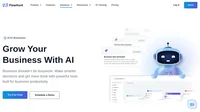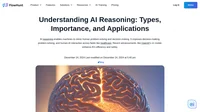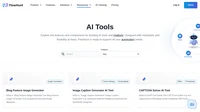Artificial Intelligence (AI) in manufacturing represents a transformative force, integrating sophisticated technologies into production processes to enhance overall productivity, efficiency, and decision-making capabilities. AI enables machines to execute tasks traditionally reliant on human intelligence, such as learning, problem-solving, and pattern recognition. This technological integration is revolutionizing manufacturing by automating complex tasks, improving precision, and optimizing operational workflows. According to a report by MIT Technology Review Insights, manufacturers view AI as essential for creating hyper-automated intelligent factories, enhancing product and process innovation, reducing cycle times, and improving maintenance and security while lowering carbon emissions. Despite its potential, the scale of AI adoption in manufacturing is often limited by challenges related to data quality, talent, and skills.
Key Technologies in AI for Manufacturing:
- Machine Learning (ML): A subset of AI, ML empowers machines to learn from data, enhancing performance over time without explicit programming. It is pivotal in building analytical models crucial for predictive analytics in manufacturing, enabling companies to anticipate equipment failures and optimize maintenance schedules.
- Deep Learning: Utilizing neural networks with multiple layers, deep learning excels in analyzing complex data sets. It is particularly effective in computer vision applications, such as detecting defects in manufacturing, facilitating enhanced product quality control.
- Natural Language Processing (NLP): This technology allows machines to understand and interpret human language, enabling applications like voice-controlled robotics and AI-driven customer service within manufacturing environments.
- Computer Vision: Empowering machines with the ability to interpret visual information, computer vision is extensively used in quality control and inspection processes, enhancing the accuracy and efficiency of defect detection.
- Robotics: AI-powered robots are employed to autonomously or collaboratively perform manufacturing tasks, significantly boosting productivity and safety.
Applications and Use Cases:
- Predictive Maintenance:
AI-driven predictive maintenance utilizes data from equipment sensors to foresee potential failures before they occur, thus reducing downtime and maintenance costs. For example, Rolls-Royce uses digital twins to monitor engine performance and predict maintenance needs, demonstrating AI’s capability to enhance operational efficiency. - Quality Control:
Through computer vision, AI systems can identify product defects with greater accuracy than human inspectors. Companies like BMW use automated image recognition in quality checks, which improves precision and reduces pseudo-defects. - Supply Chain Optimization:
AI plays a crucial role in predicting demand, managing inventory, and optimizing logistics. This capability helps companies like BMW streamline supply chain processes, thereby reducing inefficiencies. - Collaborative Robots (Cobots):
Cobots work alongside human operators, performing tasks requiring flexibility and precision. Amazon employs cobots to enhance order fulfillment processes, showcasing improved speed and reduced errors. - Generative Design:
AI software generates multiple design options based on predefined parameters, allowing manufacturers to explore various design possibilities rapidly. Airbus, for instance, leverages this technology to accelerate design processes and foster innovation. - Digital Twins:
Serving as virtual models of physical objects or systems, digital twins are utilized for scenario testing, operations monitoring, and outcome prediction. Ford uses them for energy efficiency and production line optimization. - Demand Forecasting:
By analyzing historical and real-time data, AI improves demand forecasting accuracy, aiding manufacturers like Danone in reducing forecasting errors and optimizing inventory levels. - Autonomous Vehicles:
AI-powered autonomous vehicles are increasingly used in manufacturing settings to transport materials and products efficiently, minimizing human intervention. - Process Optimization:
AI tools scrutinize manufacturing processes to identify bottlenecks and inefficiencies, facilitating improvements in production speed and resource utilization. - Robotic Process Automation (RPA):
RPA automates repetitive tasks, such as data entry and order processing, freeing human workers for more complex tasks.
Benefits of AI in Manufacturing:
- Increased Efficiency: Automation and optimization lead to faster production cycles and reduced waste.
- Cost Reduction: Predictive maintenance, optimized supply chains, and efficient resource use lower operational costs.
- Improved Quality: AI-powered quality control ensures higher product standards and reduces defects.
- Enhanced Flexibility: AI systems adapt to changes in production requirements and market demands.
- Safety: AI technologies improve workplace safety by automating hazardous tasks and monitoring safety conditions.
Challenges:
- Data Quality and Management: Effective AI systems require high-quality, structured data, a significant challenge in traditional manufacturing setups.
- Skill Gap: Implementing AI demands expertise in AI technologies and data science, often lacking in the manufacturing workforce.
- Integration Complexity: Integrating AI into existing manufacturing systems can be complex and costly.
Understanding AI Reasoning: Types, Importance, and Applications
Explore AI reasoning types, importance, and applications in healthcare and beyond. Discover how AI enhances decision-making and innovation.
Let AI Take The Guesswork Out of SEO
Boost your SEO with FlowHunt's AI tools! Research keywords, analyze competitors, create briefs & optimize content effortlessly. Try now!"



